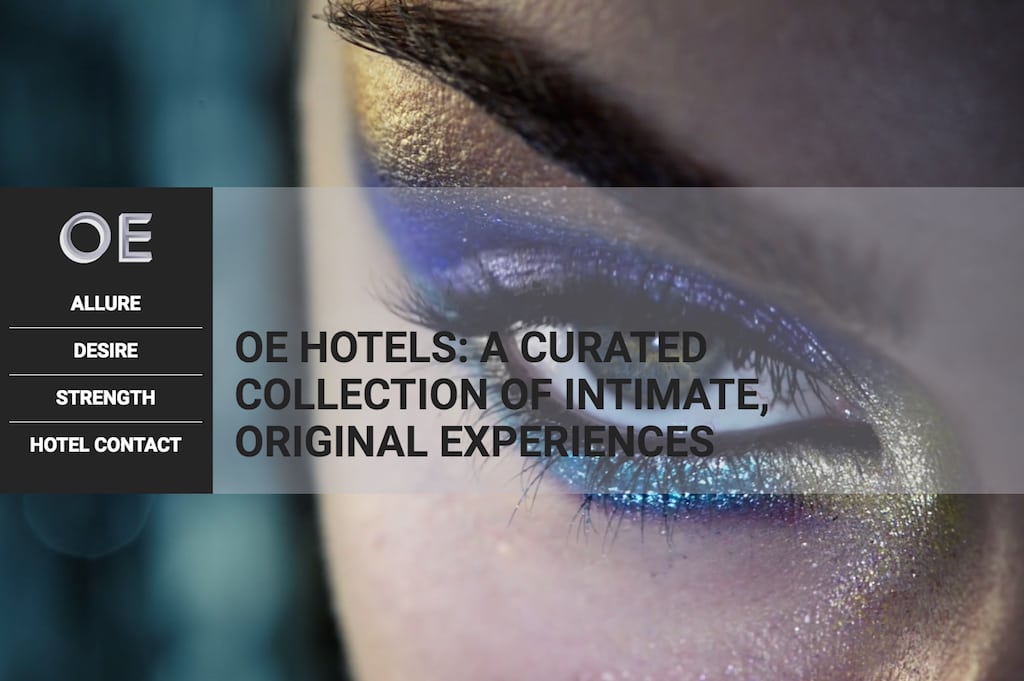Loews’ New OE Collection Aspires To Be the Thinking Man’s Lifestyle Hotel

Skift Take
Loews Hotels officially launched its spunky new OE Collection last month, marrying the luxury and lifestyle hotel segments with what it called an independent spirit and culturally attuned mindset.
Scheduled to open in Q1 2016, the first OE Collection property will be the new 100-room Bisha Hotel & Residences in Toronto, owned by Canadian nightclub and restaurant operator, Charles Khabouth. No other OE hotels or destinations have been announced to date.
With so many lifestyle brands coming to market over the last year, the traditional hotel brand delineations are dying away. Five years ago, when consumers thought about a hotel brand, they visualized carefully prepared brand standards in terms of the physical delivery. That’s not the case today with the new breed of lifestyle brands, where each hotel is positioned more as a one-off without any design commonalities whatsoever.
There are two different business models at play here. New flags like Hilton’s Canopy, Marriott’s AC Hotels and Hyatt Centric are their own consumer-facing brands, with a somewhat distinct, curated guest experience. Others like Hilton’s new Curio platform and Marriott’s Autograph Collection are purely marketing and distribution channels, where the individual hotels retain their brand autonomy, such as SLS Las Vegas Hotel & Casino, part of the Curio group.
OE Collection joins the latter. Each hotel will look and feel nothing like another because the property and neighborhood are their own uniquely branded hospitality experience. In effect, what was once the purview of the independent boutique segment, is now morphing into a mainstream lifestyle hotel market driven by the legacy brands.
So how does a company like Loews Hotels differentiate its new lifestyle product from Marriott’s, Hyatt’s and Hilton’s?
One is price. Motivated in part by the next generation traveler who prefers to spend more on F&B (food and beverage) and entertainment than room rate, many of the other lifestyle brands are shifting their business and design models to deliver more approachable rate structures. OE, rather, is intentionally targeting the upscale consumer traveler in major markets who is somewhat rate-agnostic.
Another brand differentiator is cultural context. According to Constantine Dimas, chief business officer of OE Collection, Loews’s new hospitality platform is designed to “push back” at the guest with the intent of changing people’s perspectives by emphasizing the cultural nuances of the community.
When asked for existing hotels that might provide visual clues and points of reference for OE, Dimas says the Crosby, Greenwich, and Bowery hotels in Manhattan are representative of the OE narrative.
“We want the OE Collection properties to be what we’re calling an intersection of commerce and culture,” he explains. “It’s culture that pushes back on people, and culture is difficult to find with a facsimile [copy].”
Regarding the “OE” marque, Dimas says the brand mission of OE is “operational excellence in original experiences.” The repeated usage of “O” and “E” struck a chord with Loews’ senior staff, further paralleled by the middle letters in “Loews,” and a brand was born.
Following is a slightly edited transcript of our interview with Dimas.
Skift: What inspired the birth of OE Collection?
Constantine Dimas: About a year ago, our chairman Jonathan Tisch [chairman of Loews Hotels] challenged us to take a deeply introverted and introspective look at our company, and also an outside-facing look at the market. And what we found was that within Loews Hotels, we had a tremendous pedigree based on 65 years of business. We had a very established platform over the same amount of time, and we had a tremendous track record of partnerships.
As we then looked at the properties that existed, they were typically larger hotels with a significant amount of meeting space, very family friendly, they welcomed pets, and they had a more personal touch for the bigger branded experience, but with all of the predictability of a chain hotel that you want as a consumer.
And then what we saw in the market, and we took a ten-year look, is that there would be a continuation of the quest for share amongst bigger brands that would continue to propagate and put into the market any number of facsimile concepts.
So what we wanted to do, harkening back to what defined us as Loews, is create a new business platform that was not in the business of managing hotels on a static model. But rather, sought to leverage excess capacity in our operating systems, sales and support, and put that toward lifestyle hotels, which we saw to be over the next ten years a vital and important part of the market.
Skift: Can you explain the brand positioning as it relates to the independent hotels?
Dimas: We created a collection of brands, rather than a branded collection. OE is an extension of Loews Hotels, but we positioned this intentionally, and this is important, as a collection of brands versus a branded collection. That means that OE is defined, and gathers its strength, by the hotels that populate the collection, and by the resources that it leverages from the parent, Loews Hotels.
We do that without encumbering hotels in the OE Collection with the Loews name. Hotels in the OE Collection will be higher in the lifestyle and luxury spectrum than a typical Loews hotel. They will also derive a lot of value from a strong organizing principle that changes over time as the vitality of the market changes and the needs of the consumer changes.
Skift: How will that philosophy of adaptability be manifested within OE?
Dimas: As we looked out at the market, we saw that, as an owner of an asset you had two sort of options at two different ends of the spectrum. You could either go to some of the very strong regional managers to help you manage your hotel. Or you could sign up with one of the bigger brands, and become part of their distribution. When you chose that door B, though, all too often what came along with it was a very long duration of contract in terms of management.
So what we wanted to do was say, hey, you don’t need to sign a 20-year management contract. You don’t need to sign a 10-year contract. Sign a 7-year contract. We want to manage your hotel because we’re performing well, and our incredible performance will be what causes you to renew, so don’t encumber yourselves with a name.
We built that platform to not only align with individual asset owners, but also with private equity institutional investors who frequently want to buy an asset and exit in five to seven years. One of the things that suppresses valuation when you do that, is if you either encumber an asset by name or a long management contract.
Skift: How are you attempting to differentiate the OE brand in terms of the guest experience, with so many other new players such as Hilton’s Canopy and Hyatt Centric?
Dimas: There are so many wonderful products and concepts coming to market, and anecdotally, the real winner in this environment will be the consumer because all of this competition and new products mean that the consumer has more choices.
First, we intentionally wanted to avoid words that had lost some of their meaning to us in the market: luxury, boutique, lifestyle. We’re not clear what those mean anymore.
With OE Collection, there is an organizing experience and an organizing principle. We’re not a Canopy, because Canopy is a very predictable looking space. You sort of know what to expect in a sense. For our OE hotels, we’re trying to harken back to what I call the golden age of the boutique hotels. Think of the ’90s in Miami when the Delano first opened, and someone was doing something that had not been seen before.
So for us, there has to be a strong organizing principle. Each hotel is perhaps a nightlife driven environment, or it’s a very upscale urban-driven environment, or it’s a bespoke resort environment focused around wine. For us, there always has to be a very strong organizing principle so you can immediately describe to someone before they enter the hotel what their experience will be organized around. The predictable things are incredible delivery of guest service and a high luxury space with fairly significant touch points.
But again, we want to populate OE with hotels that in one sentence can tell you what that hotel is about, and that’s our point of distinction.
Skift: Has there been much discussion internally about who the OE guest is?
Dimas: There has, and that was very important to us. Because again, when Jon Tisch challenged us to look at the market over the next ten years, invariably we looked at who the current Loews Hotel guest was. So the OE guest is a slice of the current Loews Hotel guest composition. We do not think of, and this is another point of distinction, we do not think of the OE guest as being defined just by age, just by country of origin, or just by wealth. The OE guest is someone who appreciates a high degree of service and is willing to pay a high degree of rate irrespective of their age, and who is looking for a hotel experience that leaves them in sense slightly changed.
An important point of distinction for an OE environment is that it pushes back on you. It’s not passive. It’s not static. I would say, looking sometimes at the market, all of these very intelligent concepts that are coming out are static concepts. In two years, the world will have changed but the concept is very static.
The second thing is, I don’t think it’s good enough anymore just to say, I’ve retained a well known designer and spent a significant amount of money to create a pretty space. That’s not good enough anymore. The consumer wants more.
Skift: Can you give us any concrete examples existing today that illustrate the “OE environment”?
Dimas: There are plenty of great examples, and I am the first to laud all of our colleagues. Some examples here in Gotham, I think the Crosby Hotel is an exemplary example of a concept that is OE-like, so to speak, and also fantastically run. The Greenwich Hotel in New York is another example. The Bowry Hotel is another example, where the environment there invariably affects the guest in a positive way.
In L.A., and even though this hotel is a little lower on what we anachronistically call the luxury scale, the Line Hotel in Koreatown has a very strong organizing principle. It pushes back on the guest, and it is a product of its environment. It’s designed that way. The food is informed that way. The culture of the staff is informed that way.
We want all of our hotels to have an active culture that defines a lot of the guest experiences. We want OE hotels to be what we’re calling an intersection of commerce and culture, and it’s culture that pushes back on people. Culture is difficult to find with a facsimile.
Skift: So OE is sort of like a thinking man’s lifestyle hotel? Although we probably shouldn’t frame it that way.
Dimas: But that’s correct. That is exactly correct. We’re not looking for places that are just somewhere to sleep that have been designed in an attractive way. We want the lodging experience to be meaningful.
You know, the real innovators these days are in the restaurants, and for we in the lodging space, a lot of the vibrancy has been ceded to the restaurants. We want to make sure that that vibrancy, that authenticity, that originality—those strong organizing principles that push back and make a memorable experience—are also part of the lodging experience.
Greg Oates covers hospitality and tourism development. Email him at [email protected].




